Our Research and Reports
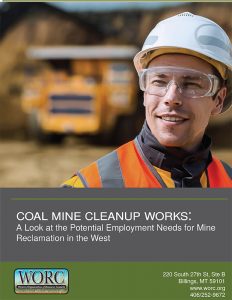
Coal Mine Cleanup Works
The collapse of the coal industry is devastating small communities across the Western United States, but reclaiming these mined lands quickly could create up to 6,081 full-time jobs per year in the critical two to three year period after mine closure according to our new report, Coal Mine Cleanup Works. The report estimates potential reclamation job creation for the Intermountain West (Colorado, Montana, New Mexico North Dakota, and Wyoming, as well as Hopi Tribe and Navajo Nation lands in Arizona and New Mexico) and provides recommendations for decision-makers to ensure cleanup is fully funded and employs the local workforce. These…
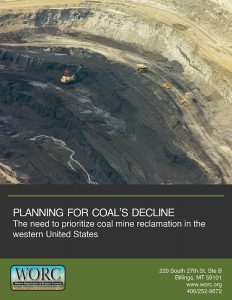
Planning for Coal’s Decline
More than a third of all land mined for coal in the Western United States awaits cleanup after a half-century of intensive strip-mining, but will a weakening coal industry be capable of cleaning it up? Planning for Coal’s Decline provides updated data on coal mine reclamation in the Western U.S. and recommends policies to help ensure coal mine cleanup before and after mine closure. Federal law requires coal companies to “contemporaneously” reclaim land mined for coal as mining progresses. As a precaution, the law also requires that mining companies provide funds or guarantees to pay for cleanup, usually through reclamation…
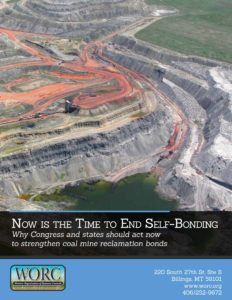
Now is the Time to End Self-Bonding
Now is the Time to End Self-Bonding makes the case for why Congress and states should act now to protect coal communities from picking up the bill for coal mine cleanup. A “self-bond” is a promise from a coal company to pay for legally required coal mine cleanup, known as reclamation, without providing any collateral. If a self-bonded coal company liquidates before completing reclamation, the self-bond becomes an uncollectible “I.O.U.” and the public is left without sufficient funds to complete reclamation. Several states continue to accept self-bonds for coal mines. There has never been a better opportunity to end self-bonding altogether…
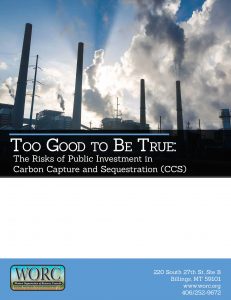
Too Good to Be True
Too Good to be True: The Risks of Public Investment in Carbon Capture and Sequestration (CCS) reports that this technology is expensive, inefficient, dirty and unreliable; by contrast, renewable energy is cleaner, cheaper and faster to deploy. As the global effects of climate change become undeniable, both market actors and governments around the world are working to reduce greenhouse gas (GHG) emissions. State and federal politicians, the coal industry, and even some environmental organizations support Carbon Capture and Sequestration (CCS) technology as a strategy to continue to generate electricity with coal in a carbon-constrained future. The industry’s hope that coal…
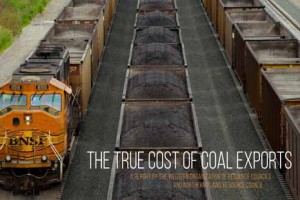
The True Cost of Coal Exports
The True Cost of Coal Exports describes the many problems with proposals to export coal through the Pacific Northwest. Coal companies have proposed building three new coal export terminals on the west coast of the United States and Canada. If successful, these proposals would vastly increase export capacity for coal from the Powder River Basin in southeast Montana and northeast Wyoming — meaning that more coal could be mined from this region, shipped by train across the United States and parts of Canada to sell on the global market. Each step of this process — mining coal, transporting coal by train,…
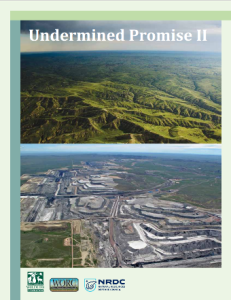
Undermined Promise II
Undermined Promise II finds that coal companies have fallen far behind in reclaiming mines, and, with the coal industry on shaky financial ground, the public faces increasing liability for massive reclamation costs of more than $3.5 billion and damage to landscapes, wildlife and crucial water supplies. The American public will be left to deal with the fallout as companies scramble to offset low prices and decreasing demand at home for coal by exporting their product to foreign markets. Reclamation bonds that coal companies are required to post under federal law may outstrip the industry’s financial resources. Out of a total of…
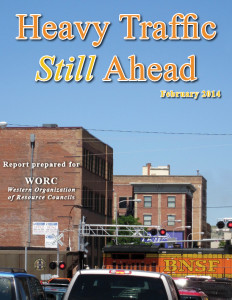
Heavy Traffic Still Ahead
Heavy Traffic Still Ahead updates WORC’s July 2012 report, Heavy Traffic Ahead, and reevaluates the anticipated increase in coal train traffic in light of the current proposals for new or expanded port facilities in the Pacific Northwest. In addition, the update discusses the combined effects of oil trains traveling from North Dakota over the same routes. The report also identifies impacts to communities along the transport route, consequences for existing rail users, including grain shippers and passenger service, and how coal export could affect rail corridors already near capacity.
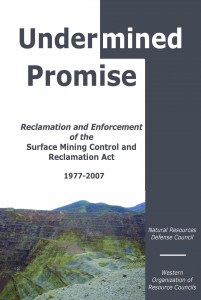
Undermined Promise
State and federal agencies are not achieving the goals of a key law enacted in 1977 to protect society and the natural environment from damage by coal mining, according to a report by the Natural Resources Defense Council and WORC. Undermined Promise: Reclamation and Enforcement of the Surface Mining Control and Reclamation Act reveals serious problems with land and water reclamation and inspection and enforcement of the law as well as with data collection and reporting. Undermined Promise was released on 30th Anniversary of the signing of the Surface Mining Control and Reclamation Act, August 3, 2007.
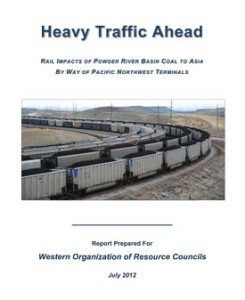
Heavy Traffic Ahead
Heavy Traffic Ahead, for the first time, identifies costs, many of which will fall on taxpayers, for infrastructure due to increased rail traffic. The report shows that coal transport could exceed 75 million tons per year by 2017 and 170 million tons per year by 2022 to the proposed terminals in the Pacific Northwest. For comparison, Transportation experts also found that increased rail traffic will affect grain producers that need access to rail space. The producers will face increased competition, potentially delaying shipments and increasing costs. State and local governments will likely bear the brunt and burden of the related infrastructure costs…
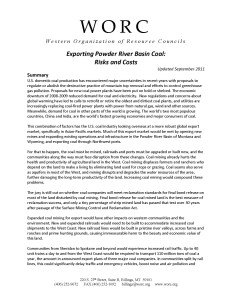
Exporting Powder River Basin Coal: Risks and Costs
WORC's Exporting Powder River Basin Coal Risks and Costs addresses the impact of coal exports and the infrastructure required to support it U.S. domestic coal production has encountered major uncertainties in recent years with proposals to regulate or abolish the destructive practice of mountain top removal and efforts to control greenhouse gas pollution. Proposals for new coal power plants have been put on hold or shelved. The economic downturn of 2008-2009 reduced demand for coal and electricity. New regulations and concerns about global warming have led to calls to retrofit or retire the oldest and dirtiest coal plants, and utilities…
